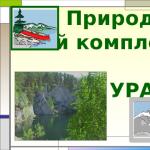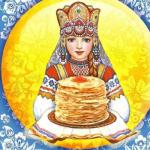Presentation - wide Maslenitsa - customs and rituals. Presentation on the topic “Maslenitsa! What is the name of each day of Shrovetide week presentation
Anastasia Sergeevna
Presentation "Maslenitsa" for senior preschool age
Maslenitsa(1 slide)
What a holiday Maslenitsa? (2 slide)
Story Maslenitsa(3 slide)
Maslenitsa- an ancient Slavic holiday that we inherited from pagan culture. This is a cheerful farewell to winter, illuminated by the joyful anticipation of imminent warmth and spring renewal of nature. It got its name from the fact that during this period of time, the last week before Lent, the consumption of butter is allowed. oils, dairy products and fish.
start date Maslenitsa varies each year depending on when Lent begins.
The main traditional attributes of folk celebrations Maslenitsa in Russia - pancakes and festivities.
(4 slide)
Maslenitsa happens in late February - early March.
It is celebrated for a week.
(5 slide)
Every day Maslenitsa has its own
name and rituals.
(6 slide)
Maslenitsa starts on Monday, which is called the meeting. On this day they meet Maslenitsa, dress up a stuffed doll, build snowy mountains, booths. Those who are richer begin to bake pancakes. The first pancake is given to the poor to commemorate the dead.
(7 slide)
Morning... Monday!
Coming "Meeting"!
Bright sleds slide down the hills!
All day fun!
Evening is coming...
Having skated to their heart's content, they eat all the pancakes!
(8 slide)
Tuesday - flirting. In the morning, young people were invited to ride from the mountains and eat pancakes. Relatives were called and acquaintances: “We have the mountains ready and the pancakes baked - please be kind”.
(9 slide)
"Flirting" careless
Tuesday is a joy.
Everyone came out to walk and frolic as one!
Games and fun, and for them reward:
Rich and rosy Maslenitsa pancake!
(10 slide)
Wednesday is delicious. On this day my son-in-law came “to my mother-in-law for pancakes”. In addition to the son-in-law, the mother-in-law invited other guests.
(11 slide)
Here the environment is suitable - "gourmet" called!
Every housewife casts a spell at the stove!
Kulebyaki, cheesecakes - they succeed in everything!
Pies and pancakes - everything is on the table!
(12 slide)
Thursday is a big revelry, the most fun day. They carry a stuffed animal on a wheel, ride around, sing songs, and start caroling.
(13 slide)
People! Nowadays “Go for a walk!
Troika, take it for a ride!
We need to drive away the winter
And call for spring!
Day four we will be together
Sing about Maslenitsa songs!
(14 slide)
Friday is mother-in-law's evening. Sons-in-law invited their mothers-in-law to visit and treated them to pancakes.
(15 slide)
Friday has come - "Evening with mother-in-law".
Mother-in-law comes to her son-in-law for pancakes!
And for pancakes, caviar, salmon and sour cream,
Help yourself, mother-in-law, you’re like a mother to me!
(16 slide)
Saturday - sister-in-law's get-togethers. On this day, young daughters-in-law invited their sisters-in-law to visit them. The newlywed daughter-in-law had to give gifts to her sisters-in-law.
(17 slide)
Saturday is approaching - "Sisters-in-law's treat".
All the relatives meet and dance in a circle.
The holiday continues, general fun.
A nice farewell to Zimushka!
(18 slide)
Last day Maslenitsa- Forgiveness Sunday or farewell. The party ends, fires are lit on the ice slides to melt the ice and destroy the cold. They ask for forgiveness and do merciful deeds.
(19 slide)
Bright Sunday is coming quickly.
All ease the soul "forgiveness day".
The straw effigy is burned,
Dressed in a sheepskin coat, felt boots, a belt….
(20 slide)
Goodbye, goodbye, goodbye
Our Maslenitsa!
You didn’t come on Wednesday and you didn’t come on Friday.
You came on Sunday
Fun all week!
Fun all week!
You came with goodness
With cheese, butter and egg!
With pancakes, with pies,
Yes with pancakes!
(21 slides)
Many people think that on the last day Maslenitsa week
burning an effigy Maslenitsa, but no, not Maslenitsa is burned,
and farewell to Winter!
In the old days, men and women took from their yard
a bunch of straw, put them in one pile, from which everyone then
the village made a doll, dressed it up "womanish"- in bright skirts,
they tied sweaters and a smart scarf and carried them all over the city
in a sleigh, greeting and honoring the Madam - Maslenitsa. And then
burned at the stake, throwing pancakes into the fire, as a funeral
food The children were told that all the nourishing food was burned in the fire,
thereby explaining to them why during Lent they only eat
lean food.
(22 slide)
Sayings about Maslenitsa
Not living, but Maslenitsa.
Not everything is great for the cat Maslenitsa, there will be Great Lent.
Maslenitsa lasts for seven days.
Shrove Tuesday, took care of the money.
This Maslenitsa is coming, damn it, it carries honey.
No pancakes Maslenitsa.
Pancakes, pancakes, pancakes, like the wheels of Spring.
Publications on the topic:
Summary of OOD for children of senior preschool age within the framework of the “Broad Maslenitsa” project Municipal preschool educational institution "Kindergarten No. 274 of the Krasnoarmeysky district of Volgograd" "Broad Maslenitsa"
Summary of direct educational activities for children of senior preschool age “Hello, Maslenitsa” Summary of the educational activity “Hello, Maslenitsa!” for children of senior preschool age Completed:.
Summary of direct educational activities for senior preschool age “Maslenitsa” Topic: Maslenitsa. Integration of educational areas: “Artistic-aesthetic”, “Cognitive-speech”, “Communicative-personal”.
Presentation “Journey into Space” for senior preschool age The presentation “Journey into Space” was developed for senior preschool age on the cognitive development of children “Me and the world around me.”
Scenario of the Maslenitsa holiday for children of senior preschool age Prepared by: ILALOVA AIGUL AZATOVNA, music director of MBDOU.
1 slide
Madam Maslenitsa. Ismailova Natalya Useinovna, teacher of Russian language and literature, KSU OSSH named after. T. Aubakirova s. Igilik, Maktaaral district, South Kazakhstan region

2 slide
The Russian folk holiday Maslenitsa (cheese week) is an ancient Slavic holiday with numerous customs, preserved in Rus' since pagan times. The ritual, which has survived through the centuries to the present day, is associated with saying goodbye to winter and welcoming spring.

3 slide
This year Maslenitsa is celebrated from February 28 to March 6. The start date of Maslenitsa changes every year depending on when Lent begins. The main traditional attributes of the folk celebration of Maslenitsa in Russia are pancakes and festivities.

4 slide
Maslenitsa is a mischievous and cheerful farewell to winter and a welcome to spring, bringing revival in nature and the warmth of the sun. From time immemorial, people have perceived spring as the beginning of a new life and revered the Sun, which gives life and strength to all living things. In honor of the sun, unleavened flatbreads were first baked, and when they learned how to prepare leavened dough, they began to bake pancakes. Ancient people considered the pancake a symbol of the sun, since it, like the sun, is yellow, round and hot, and they believed that together with the pancake they eat a piece of its warmth and power.

5 slide
Each day of Maslenitsa had its own name: 1st day - pancake; Day 2 - pancakes; Day 3 - pancakes; Day 4 - pancakes; Day 5 - blinks; Day 6 - pancakes; Day 7 - royal pancakes

6 slide
Monday - “meeting” On the first day of Maslenitsa, in the morning the children made a straw doll - Maslenitsa and dressed it up. And then everyone walked together from house to house singing. The housewives treated everyone to pancakes.

7 slide
Tuesday - “flirt” The second day, as a rule, was considered a day for the young. Shortly before Maslenitsa, weddings took place. And now these young families were invited to ride down the mountain. On this same day, there was not only skiing from the mountains, but also a pancake treat in all houses: on these days, young people played, danced in circles, and sang.

8 slide
Wednesday - “gourmet” On Wednesday, mothers-in-law invited their sons-in-law for pancakes. There is even an expression in Russian “to your mother-in-law for pancakes.” After feasting on pancakes, the guests sang songs.

Slide 9
Thursday - “go for a walk” On this day, everyone, young and old, gathered for the holiday. Famous fist fights and the capture of snowy towns took place. After the capture of the town, a feast on the mountain began, and then the rest of Maslenitsa fun, for example, climbing a pole to get a gift.

10 slide

11 slide

12 slide
On this day, it was the mother-in-law's turn to visit her son-in-law: pancakes were baked for the mother-in-law. The son-in-law had to personally invite his mother-in-law. The mother-in-law, invited by her son-in-law, sent her son-in-law everything from which pancakes were baked and with what. Friday – “mother-in-law’s party”

Slide 13
Saturday “sister-in-law's gatherings” On this day of Maslenitsa, a straw effigy was carried on a stretcher to the end of the village with songs, a large bonfire was made there, and Maslenitsa was burned in it. They had fun around the fire: they sang songs and danced.

Slide 14

15 slide
Forgiveness Sunday. On Sunday, everyone remembered that Great Lent began on Monday, therefore, trying to cleanse themselves of everything sinful, people asked each other for forgiveness. The farewell ended with a kiss and a low bow.
Evgenia Kirillova
Presentation on the theme “Maslenitsa!”
Dear Colleagues! It's Maslenitsa week. I would like to share with you my material, which I prepared in the form of a presentation about Maslenitsa for my middle school children. I will be glad if it is useful to someone.
First, I post the text for demonstrating each slide, and the presentation itself below.
PRESENTATION OF “OIL TA"
1 slide. Guys, today I will tell you about one of the most fun and interesting holidays in our country - Maslenitsa. Maslenitsa is one of the brightest, funniest, noisiest and unforgettable holidays of the year. This is a holiday that was celebrated by our grandmothers and great-grandmothers, that is, it appeared a long time ago.
2 slide. During Maslenitsa week we said goodbye to winter and welcomed spring. We can judge that spring is approaching by the fact that the sun rises earlier, which gradually begins to warm up, and the birds begin to chirp.
3 slide. We still celebrate Maslenitsa. The main decoration of this holiday is the pancake. Do you know why? He is very similar to the sun. The pancake symbolizes the sun.
4-5 slide. Maslenitsa was called cheese week. People were having fun, skiing and sledding down the mountains, riding horses, taking over a snowy town, and having fist fights. By descending from the mountain they judged their own fate: whoever leaves the mountain safely will have a good year ahead; The further you slide, the longer your life will be. The kids made snow slides and sledded down them. They also made snow women, or snowmen, from snow.
6 slide. Maslenitsa has always been loved by the people, because it is a holiday that is always accompanied by fun: all relatives, friends and relatives gather, festivities at home and on the street, dancing, practical jokes, and merry mummers. No one was ever bored at Maslenitsa, and everyone always celebrated, because according to Russian legend, if you don’t take a walk on Maslenitsa, you won’t be happy for a whole year.
Slide 7 Each day of Maslenitsa had its own name and ritual meaning.
Monday was called “meeting”.
On this day, they celebrated Maslenitsa, dressed up a stuffed doll, put this stuffed animal on a pole and, singing, drove it on a sleigh around the village. Then Maslenitsa was staged on a snowy mountain, where sleigh rides began. Relatives visited each other and agreed on how they would spend the week.
8 slide. Tuesday – “flirt”.
From this day on, various unbridled games and fun began: sleigh rides, folk festivals, performances. In large wooden booths (rooms for folk theatrical performances with clownery and comic scenes) performances were given led by Petrushka and Maslenitsa grandfather. Masked mummers walked the streets. While visiting friends' houses, they impromptu organized funny home concerts. In large groups we rode around the city, in troikas and on simple sledges. Another simple entertainment was held in high esteem - skiing from icy mountains.
Slide 9 Wednesday – “gourmet”.
Every family set tables with delicious food, baked pancakes, and brewed beer in the villages. Theaters and stalls appeared everywhere. They sold hot sbitni (drinks made from water, honey and spices, roasted nuts, honey gingerbread cookies. Here, right in the open air, you could drink tea from a boiling samovar.
10 slide. Wide Thursday.
This is where the main fun begins: they carry a stuffed animal, ride around, sing ditties, go caroling. This is probably where “it’s not all about Maslenitsa” comes from here; before Lent you need to get some exercise.
11 slide. Friday is mother-in-law's evening.
The most important event was the visit of the mother-in-law by her sons-in-law, for whom she baked pancakes and arranged a real feast (if, of course, she liked the son-in-law). In some places, “mother-in-law’s pancakes” took place on dainty days, i.e. on Wednesday during Shrovetide week, but could be timed to coincide with Friday. If on Wednesday the sons-in-law visited their mothers-in-law, then on Friday the sons-in-law held a “mother-in-law party” - they invited them to pancakes. The mother-in-law had to send in the evening everything necessary for baking pancakes: a frying pan, a ladle, etc., and the father-in-law would send a bag of buckwheat and cow butter. The son-in-law's disrespect for this event was considered dishonor and insult and was the reason for eternal enmity between him and his mother-in-law.
12 slide. Saturday - sister-in-law's get-togethers.
On Saturday, young daughters-in-law received their relatives, and they gave gifts to their sisters-in-law - their husband's sisters.
13 slide. Forgiveness Sunday (kissing party, farewell)
On this day we celebrated Maslenitsa. The straw effigy was honored, invited to return again next year, and then taken to the outskirts, where it was burned at the stake. On the last day of Maslenitsa, everyone asks each other for forgiveness, freeing themselves from sins before Lent: “Forgive me if I am guilty” - “And you forgive me” - “God will forgive.” All this was accompanied by bows and kisses.
Slide 14 Maslenitsa is leaving, and with it winter.


- Maslenitsa is a pagan holiday,
connected
happy spring day
solstice.
- With acceptance
Christianity
she became
anticipate
Great Lent.
- For the Slavs, for a long time it was also a New Year's Eve! After all, until the 14th century, the year in Rus' began in March. And according to ancient beliefs, it was believed that as a person greets the year, that’s how he will be. Hence the expression: “At least pawn everything from yourself, but celebrate Maslenitsa.”

- Maslenitsa
- Shrovetide
- Cheese week
- Cheese Maslenitsa
- Cheese week
- I ate
- Obedukha
- Boyarynya - Maslenitsa
- Pancake eater
- Ravager
- Wide
- Gluttonous
- Razgulnaya
- Cheerful
- Honest


Maslenitsa rituals
Funeral
Marriage and family
Agricultural

Funeral rites
Preparation of other funeral food. Such, for example, as a fish.
Pancakes are part of the funeral ritual, since on the eve of Maslenitsa the Slavs remembered their deceased relatives and worshiped the souls of their ancestors. The first baked pancake was given to the poor or placed on the “spirit window” to appease the spirits.
Prohibitions on performing certain types of household work during this period, especially women’s work, such as spinning, sewing and weaving, especially in the evening.
Maslenitsa bonfires served as an invitation to deceased ancestors to a hearty dinner on the eve of Lent.

- Maslenitsa is the time of weddings.
- Those who did not marry were punished: a log was hung around the neck of a single guy or an unmarried girl, which symbolized the missing “half.” Those punished had to walk with this “couple” all day until the evening and endure endless ridicule.
- Women who had been married for the first year were harnessed to sleighs instead of horses and forced to ride their friends around the village with songs and jokes.
- The newlyweds were given “watching parties”, for example, they were forced to kiss in front of everyone.

- Skiing from the mountains: it was believed that whoever rolled down the mountain more times or whoever rode further would have more flax, so people said that they were going skiing “for a long flax”.
- Horseback riding: the sound of hooves “awakens” the earth. The better the soil is “awakened”, the richer the harvest.
- A symbolic farewell to winter, the burning of an effigy.

- Monday - Meeting
- Tuesday - Flirting
- Wednesday - Lakomka
- Friday - Mother-in-law's party
- Saturday – Sister-in-law’s gatherings
- Sunday – Forgiveness Day, Forgiveness Sunday

In the old days, taking a bunch of broken scraps from their yard, the villagers put them in one pile, from which they then all made a doll together, dressed it up “like a woman” and carried it in a sleigh through the streets, greeting and honoring the Maslenitsa Madame, and then they put him in the highest place.
Sometimes, instead of a scarecrow of Maslenitsa, they carried an elegant girl or a brightly painted old woman in a sleigh, and at the end of the holiday, they took the sleigh out of town and dumped the “passenger” into a snowdrift to everyone’s laughter, thereby, as it were, “burying Maslenitsa.”

- During the Maslenitsa meeting they always sang the following songs:
- Oh yes, Maslenitsa is moving into the yard, The wide one is moving into the yard! Oh yes Maslenitsa, stay for a week, Wide, visit another!
- And with caviar and sour cream - They are all delicious! Nostrils and blush - Our sunshine pancakes!
- They started baking pancakes.

In the morning, young people were invited to ride from the mountains and eat pancakes. They called relatives and friends: “We have mountains ready and pancakes baked - please be kind.”
Near the icy mountains there was a brisk trade in hot sbiten, tea from smoking samovars, sweets, nuts, pies and pancakes.
I. Shurikhina "Maslenitsa"

Oh, you Gourmet Wednesday! Oil pan! As has been the case since ancient times - Let's go
to my mother-in-law for pancakes!
The mother-in-law anointed her son-in-law's head with oil so that he would be affectionate and “stick to his wife.”

All residents of villages and hamlets organized round dances, booths, fist fights, fun games and feasts. On the same day, fist fights were held.
THURSDAY – RUNNY, FRACTURE, WIDE THURSDAY
The “narrow” Maslenitsa ended and the “wide” one began. It was from this day that the general celebration of Maslenitsa began.
Kustodiev B.M. "Maslenitsa"

- For combat, special fur mittens and thick hats were required.
- According to the old saying, whose village wins, the harvest will be greater.
- One of these battles is described in “The Song of the Merchant Kalashnikov” by M.Yu. Lermontov.
In the old days there were three types
fist fights:
- one-on-one combat;
- “wall to wall”;
- "coupler - landfill."

THURSDAY – RUNNY, FRACTURE, WIDE THURSDAY
An important event of this day was the capture of the snowy town - a symbolic battle of spring and winter.
V. Surikov “Taking the Snow Town”
The players are divided into “foot” and “mounted”. “On foot” occupy the city, “on horse” are preparing for an attack. The besieged defend the city against the "cavalry", preventing it from breaking into the fortress gates, beating them off with brooms.


Friday gave mothers-in-law a chance to take a break from cooking and go on a return visit to their sons-in-law, who were obliged to show them respect and, of course, treat them to pancakes.
The son-in-law had to personally invite his mother-in-law in the evening, and in the morning he also had to send special messengers - “invitees” - for her.


On Maslenitsa Sunday
Old Titus tried everything
Ask everyone for forgiveness
And answer:
« God forgive !»
Our ancestors asked each other for forgiveness and heard in response: “God will forgive.” This tradition has survived to this day.

- Maslenitsa week ended with the burning of an effigy. This action drove away darkness, winter, and death.
- The fire symbolized the sun.
- The ashes were scattered across the field to ensure a good harvest.
- Sometimes the remains of pancakes and butter were burned in the fires, milk was poured into them, and the children were told that all the hearty dishes were burned in the fire.

" Conquest "
Maslenitsa pillar
Fair where they traded
not just pancakes,
Pies and various sweets,
but also handicrafts.

The Slavs have always widely celebrated Maslenitsa. Is Maslenitsa celebrated in other countries?
In Catholic countries, such a holiday is celebrated, but has other names: Pancake Day ( England ) , Fat Tuesday ( USA ) , Mardi Gras ( France ) Beltane ( Ireland, Scotland ) .
Maslenitsa is for us like carnival for Italians. Moreover, translated from Italian, “carnival” means “Beef, goodbye!” And Maslenitsa, which precedes Lent, has long been called “Meat Empty”, since it was forbidden to eat meat during this week.
Russian Maslenitsa is essentially an analogue of Halloween, because the purpose of both holidays is to “appease” the spirits for the whole year ahead.

“You know that pancakes have been living for more than a thousand years... They were born before Russian history, they survived it all from the beginning to the last page.”
(A.P. Chekhov)
- Neither weddings, nor funerals, nor parenting days were complete without pancakes.
- Since ancient times, there have been many signs and fortune telling associated with pancakes.

Eating pancakes
couldn't be used
knife or fork
so as not to provoke
destructive for rural
farms
natural phenomena.
If the hostess
borrowed a frying pan
it was considered a bad omen
return it empty
(on it certainly
should have stayed
1 pancake – the last one).
Remaining
end of the week pancakes
should have been burned
in the fire,
in which she burned
straw Maslenitsa,
so as not to leave evil .
When preparing the dough,
you can't enter
neither look nor ask...
If anyone
will look in and say:
“What good dough!”
then at least pour it out -
the pancakes won't work out!

Sayings about Maslenitsa
- Don't live
- Shrove Tuesday,
- Damn is not a sheaf -
- Damn is not a wedge,
- At least pawn everything off yourself,
- Like on oil week
- Ride in the mountains
- Every day is not Sunday,
and Maslenitsa!
took care of the money.
You can’t prick it with a pitchfork.
the belly will not split.
and celebrate Maslenitsa.
Pancakes were flying at the ceiling.
roll around in pancakes.
There will be Lent too.







